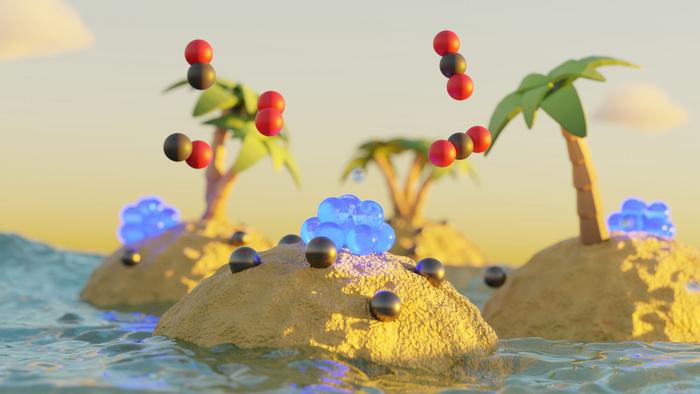The Objective: Best Possible Catalytic Performance

Credit: Photo: ITCP, KIT
The Objective: Best Possible Catalytic Performance
Noble-metal catalysts are used in many processes in the chemical industry. A reduction of the amount of noble metal required for their production is an important contribution to a sustainable resource use. “Our approach will significantly improve the catalyst stability and ensure the formation of active noble-metal clusters even with a very low amount of noble metal used,” says Dr. Daria Gashnikova from KIT’s Institute for Chemical Technology and Polymer Chemistry (ITCP), who is the lead author of the study. To obtain the best possible catalytic performance using the smallest possible amount of noble metals, the ITCP researchers investigated frequently used supported catalysts atom by atom. In these supported catalysts, the material where the reaction takes place is finely distributed on the support as small nanoparticles. These clusters are dynamic and change their structure depending on the reaction conditions. They can combine with each other and grow into larger particles so that fewer surface atoms are available for the reaction. However, they can also break down into single atoms that are ineffective on their own. Both phenomena reduce the catalytic performance. The novel concept developed by the ITCP researches solves this problem by taking advantage of the varying interactions of noble metals with different support materials.
Newly Designed Support Material – Noble-Metal Atoms Gather to Form Ceria “Islands”
“Noble metals, such as Palladium, tend to bond intensely with ceria, but hardly interact with aluminum oxide,” explains Gashnikova. “This is why we applied palladium to tiny ceria ‘nano-islands’ which in turn were finely distributed on aluminum oxide,” says the scientist. The optimization of the support material ensures that the noble metal atoms preferably form sites on the ceria islands. The distance between the islands on the one hand and the limited mobility of ceria-bound palladium on the other hand prevent both the formation of excessively large clusters and the decomposition of the palladium into single atoms. The size of the noble-metal clusters is defined by the number of noble-metal atoms on the individual ceria islands. “Our dream is to walk the fine line during the entire lifetime of the catalyst, and, if possible, to stabilize small particles consisting of only ten to 50 atoms,” says Professor Jan-Dierk Grunwaldt, member of the ITCP Management team and spokesperson of the Collaborative Research Center (CRC) 1441, “TrackAct”.
Collaborative Research Center 1441 “TrackAct”
In the CRC 1441, “TrackAct“, funded by the German Research Foundation, more than 20 interdisciplinary research groups are working to gain a better understanding of the fundamental catalytic processes. The concept developed at the ITCP is one of the key results of the CRC launched in 2021, where KIT is conducting research together with TU Munich and Deutsches Elektronen-Synchrotron DESY. “The fundamental understanding of the structure and mechanism of catalysts will provide us with a kind of toolbox we can use to design optimal catalysts for each individual process in a knowledge-based and efficient manner,” says Dr. Florian Maurer, “TrackAct“ coordinator and co-author of the study.
Original publication
Daria Gashnikova, Florian Maurer, Eric Sauter, Sarah Berart, Jelena Jelic, Paolo Dolcet, Carina B. Maliakka, Yuemin Wan, Christof Wöll, Felix Studt, Christian Kübel, Maria Casapu, and Jan-Dierk Grunwaldt: Highly Active Oxidation Catalysts through Confining Pd Clusters on CeO2 Nano-Islands. Angewandte Chemie, 2024 DOI: 10.1002/anie.202408511
Videos:
https://www.youtube.com/embed/DuuNxyhJPj8?si=mTrcpkS8o7SjagKs
https://www.youtube.com/embed/2f9E7RiO_BQ?si=egWwERwNXHWZD1VI
Being “The Research University in the Helmholtz Association”, KIT creates and imparts knowledge for the society and the environment. It is the objective to make significant contributions to the global challenges in the fields of energy, mobility, and information. For this, about 10,000 employees cooperate in a broad range of disciplines in natural sciences, engineering sciences, economics, and the humanities and social sciences. KIT prepares its 22,800 students for responsible tasks in society, industry, and science by offering research-based study programs. Innovation efforts at KIT build a bridge between important scientific findings and their application for the benefit of society, economic prosperity, and the preservation of our natural basis of life. KIT is one of the German universities of excellence.
Journal
Angewandte Chemie
Method of Research
Experimental study
Subject of Research
Not applicable
Article Title
Highly Active Oxidation Catalysts through Confining Pd Clusters on CeO2 Nano-Islands
Article Publication Date
15-Jun-2024



